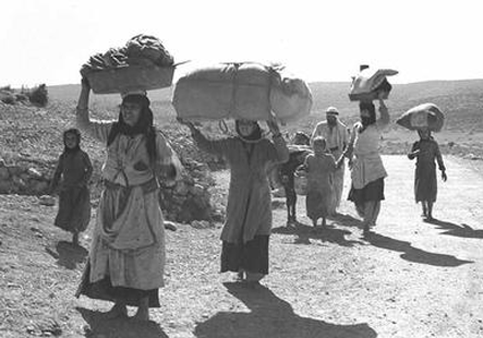The Electronic Intifada 8 May 2003

Palestinian refugees moving from northern Palestine to Lebanon (Photo: PalestineRemembered)
Today, Israel celebrated its 55th birthday by killing 18-month-old Eliyan al-Bashiti. The toddler was shot in his neck when Israel’s occupation forces at the Gadid colony fired on Khan Younis. Eliyan was in his home when he was killed.
At noon today, an Israeli Apache attack helicopter fired missiles at a car killing the driver, yet another extra-judicial execution. With the usual killing of civilians in the occupied Palestinian territories, Israel celebrates its 55th birthday, and Palestinians commemorate the Nakba (“the catastrophe”): the expulsion and dispossession of hundreds of thousands Palestinians from their homes and land in 1948. Without this expulsion and dispossession, Israel would never have come to be “the Jewish State.” This original sin will not be forgotten by those who were its victims, and who have lived more than a half-century in exile.
Even today, Israeli Prime Minister Ariel Sharon tries to ignore the plight of Palestinian refugees. In fact, in a recent interview with Israel Radio, Sharon insisted that Palestinians drop their demand for the refugees’ right of return “if negotiations are to proceed.” He said: “The right of return is a recipe for the destruction of Israel. We will not accept such a thing. We made that very clear. This is something Israel insists on and sees as a condition for continuing the process.”
What process, I wonder? Who does he want to fool? Did he really believe that Palestinians would easily forget what happened? How could they forget the killing of their grandparents, fathers and mothers? Between 1948 and 1949, Israeli forces killed at least 13,000 Palestinians. Next week, Palestinians commemorate the tragedy of Tantura (May 15, 1948), where Israeli troops killed two hundred Palestinians. On the day Israel was born, Israeli armed forces took over the village, lined 95 men up against a cemetry wall and shot them. Other villagers were killed inside their homes and in other parts of the village. The village was later demolished to make way for a parking lot and the Nahsholim kibbutz.
You cannot force people to ignore or forget the fact that their relatives, neighbours, and friends have been dispossessed, uprooted and expelled. They, the remaining Palestinian communities, were forced to live in separate, inferior, and fragmented enclaves within the bounderies of what became Israel and the land that Israel later occupied in 1967.
Is there a name for an action that reduced the number of Palestinians within the historic bounderies of Palestine from 70 percent to under 50 percent? In 1948 more than 60 percent of the total Palestinian population was expelled. More than 530 Palestinian villages were depopulated and completely destroyed. Palestinian property spread over hundreds of Palestinian towns and villages, including homes, household effects, cash, heavy equipment, trucks and whole flocks of cattle, were plundered and looted. Israel confiscated and over four million acres of land, tens of thousands of homes, apartments, shops, factories and other facilities. Palestinians await compensation for these immense losses.
More than 37,000 Palestinians became internal refugees in 1948. Even after the cease fire in 1949, Israel continued to expel thousands of Palestinians, notably from the area north east of Tel Aviv known as the “little triangle,” and in the south from Majdal to Faluja and Bir Saba, the Hebron region, and from the east and north of the Sea of Galilee. It even expelled those Palestinians it decided were “illegals.” For example, in the Negev desert, between 1949 and 1953, Israel expelled close to 17,000 Bedouins.
To date, Israel has prevented the return of approximately six million Palestinian refugees, who have either been expelled or displaced. To date, approximately 250,000 internally displaced Palestinian second-class citizens of Israel are prevented from returning to their homes and villages. Israel has uprooted three-fourths of the Palestinian people from their land, making this the largest and one of the longest standing unresolved refugee cases in the world today. The majority of Palestinian refugees, those who live in the West Bank and Gaza and those who live within the bounderies of what became Israel, live within 100 miles of their places of origin but are denied their right to return to their homes and lands.
Given the foregoing information, might one not find it strange that the appointed Palestinian Prime Minister Mahmoud Abbas said he rejected Sharon’s position on refugees. Of course he said: “This is unacceptable and unreasonable demand.” If there is one point on which I agree with Abu Mazen it is this: “The right of return is one of every refugee and I cannot abandon this right.”
Arjan El Fassed is one of the founders of Electronic Intifada and Electronic Iraq.
Related Links:



